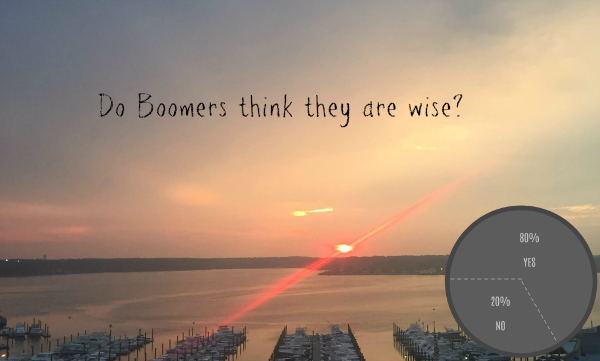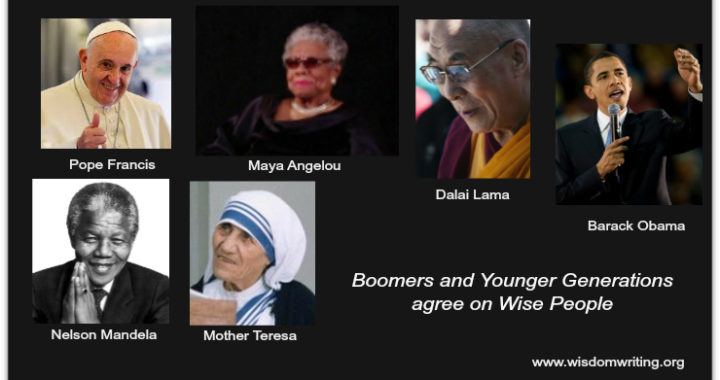The third question in a 2018 survey responded to by 239 individuals age 56-75, allowed them to identify the sources they use to cultivate wisdom in their lives and to indicate the ones they find most helpful. Just like the responses of Millennials and Gen X, their answers were evenly distributed across the choices provided -with the highest number of responses belonging to reflecting on life experience and the lowest being the reading of sacred texts.
Favorite Sources of Wisdom from Highest to Lowest
- Reflecting on Life Experience*–208 respondents
- Friends and Family*–189 respondents
- Articles and Books*–187 respondents
- Being in Nature*–170 respondents
- Spiritual Practice—149 respondents
- Religious or Spiritual Leaders—129 respondents
- Creative Pursuits (music, art, poetry….)–125 respondents
- Personal/Journal Writing—91 respondents
- Sacred Texts—85 respondents
*Same order of preference as Millennial and Gen X respondents
The comments section of this question asked the respondents to share which of the sources were the most helpful to them and here is where they described the reasons behind their selections. Note: 5% of the respondents did not leave a comment and 6% said that all the choices were equally important. For the remaining 89%, they enumerated on their selections with descriptions of how they closely observed and reflected on the interactions with the people in their lives, participated in a daily spiritual practice or engaged in journal writing. A good majority were reading, attending workshops or training with a spiritual teacher or mentor. They listened to the opinions of family and friends who had earned their respect. Being in nature was rejuvenating and centering and the environment sought to renew one’s spirit. Though only 5% were reading sacred texts, the ones who were engaged shared that it was a regular practice that enlightened them as they connected the wisdom to their everyday experiences.
What is your reaction to thinking about yourself as a source of wisdom?
The response to this question was consistent with the Boomer’s reaction to being asked if they considered themselves to be wise, 80% provided a positive answer ranging from being comfortable with the concept to acknowledging that they were a “work in progress” or that this was the first time they had ever considered such a question. For the majority that was accepting of themselves as a source of wisdom, it was with great humility (the most frequently cited word in their descriptions) and a strong sense of responsibility that they accepted the honor. Many felt that wisdom did indeed “come with age” but they were quick to distinguish the selective nature of this. “I have wisdom for those whose experiences I have lived. Others have wisdom for me.” The opportunity to share one’s personal wisdom was considered a blessing by some, particularly if they felt connected to their spiritual source.
For those that did not consider themselves to be a source of wisdom, their comments expressed fear, laughter and an admission that it was egotistical to think of one’s self in this way. This was different than the response of those who were thinking about it for the first time (and shared that they were “pleasantly surprised” with the possibility). The reticence shared by those not wanting to “own” that they could be a wisdom source was often accompanied by statements that they were “only a student” and it was a great responsibility to share what they learned with another person.
In the words of Sandra Marinella, author of The Story You Need to Tell, “…all humans who seek and search for wisdom as a life goal should evolve to the point of seeing themselves not simply as a collector of wisdom but also as one who shares wisdom with others when called to share it. It is a rewarding aspect of aging–being able to give back and mentor others.”



